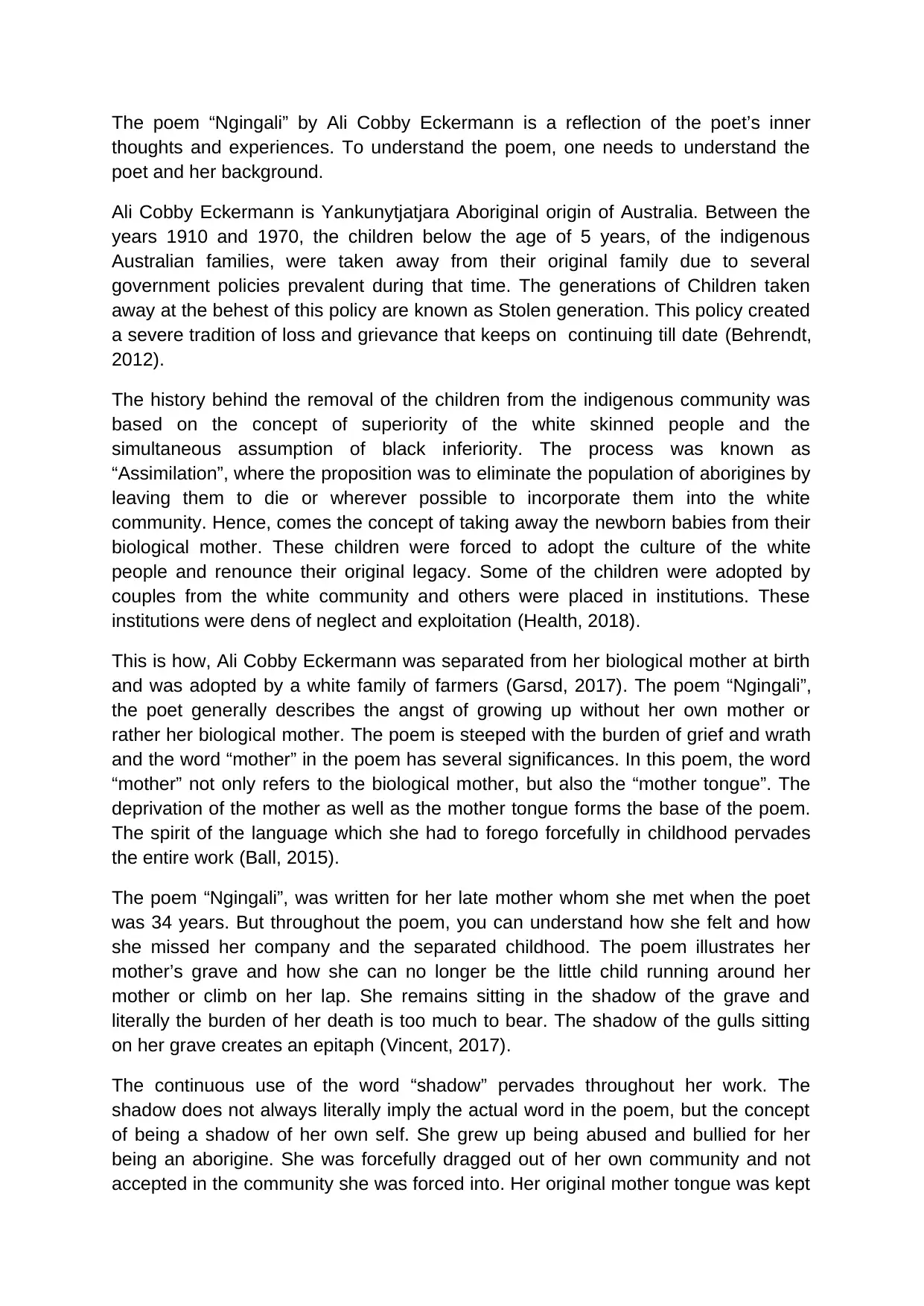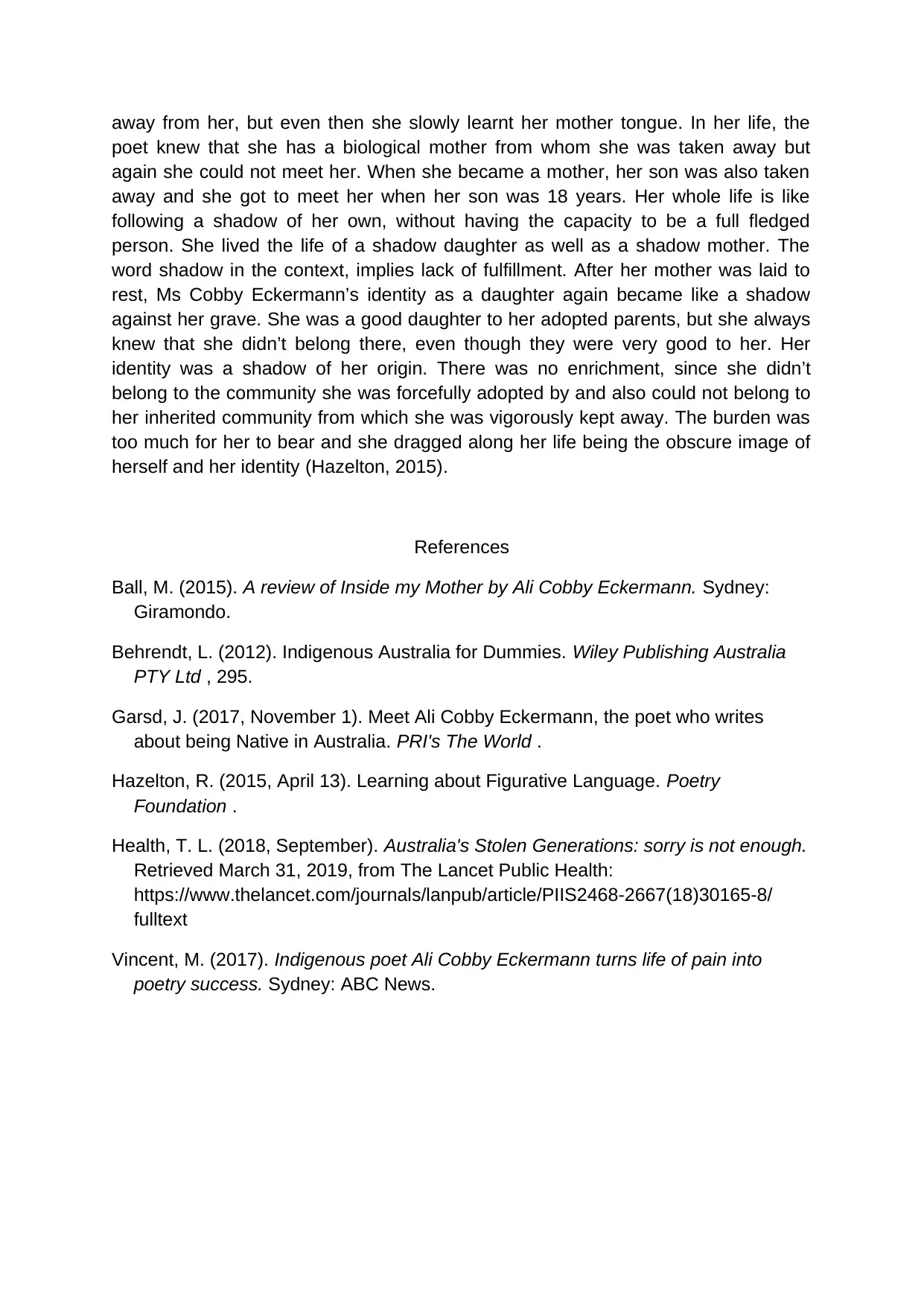The poem “Ngingali” by Ali Cobby Eckermann is a reflection of
VerifiedAdded on 2023/04/19
|2
|1001
|424
AI Summary
Contribute Materials
Your contribution can guide someone’s learning journey. Share your
documents today.

The poem “Ngingali” by Ali Cobby Eckermann is a reflection of the poet’s inner
thoughts and experiences. To understand the poem, one needs to understand the
poet and her background.
Ali Cobby Eckermann is Yankunytjatjara Aboriginal origin of Australia. Between the
years 1910 and 1970, the children below the age of 5 years, of the indigenous
Australian families, were taken away from their original family due to several
government policies prevalent during that time. The generations of Children taken
away at the behest of this policy are known as Stolen generation. This policy created
a severe tradition of loss and grievance that keeps on continuing till date (Behrendt,
2012).
The history behind the removal of the children from the indigenous community was
based on the concept of superiority of the white skinned people and the
simultaneous assumption of black inferiority. The process was known as
“Assimilation”, where the proposition was to eliminate the population of aborigines by
leaving them to die or wherever possible to incorporate them into the white
community. Hence, comes the concept of taking away the newborn babies from their
biological mother. These children were forced to adopt the culture of the white
people and renounce their original legacy. Some of the children were adopted by
couples from the white community and others were placed in institutions. These
institutions were dens of neglect and exploitation (Health, 2018).
This is how, Ali Cobby Eckermann was separated from her biological mother at birth
and was adopted by a white family of farmers (Garsd, 2017). The poem “Ngingali”,
the poet generally describes the angst of growing up without her own mother or
rather her biological mother. The poem is steeped with the burden of grief and wrath
and the word “mother” in the poem has several significances. In this poem, the word
“mother” not only refers to the biological mother, but also the “mother tongue”. The
deprivation of the mother as well as the mother tongue forms the base of the poem.
The spirit of the language which she had to forego forcefully in childhood pervades
the entire work (Ball, 2015).
The poem “Ngingali”, was written for her late mother whom she met when the poet
was 34 years. But throughout the poem, you can understand how she felt and how
she missed her company and the separated childhood. The poem illustrates her
mother’s grave and how she can no longer be the little child running around her
mother or climb on her lap. She remains sitting in the shadow of the grave and
literally the burden of her death is too much to bear. The shadow of the gulls sitting
on her grave creates an epitaph (Vincent, 2017).
The continuous use of the word “shadow” pervades throughout her work. The
shadow does not always literally imply the actual word in the poem, but the concept
of being a shadow of her own self. She grew up being abused and bullied for her
being an aborigine. She was forcefully dragged out of her own community and not
accepted in the community she was forced into. Her original mother tongue was kept
thoughts and experiences. To understand the poem, one needs to understand the
poet and her background.
Ali Cobby Eckermann is Yankunytjatjara Aboriginal origin of Australia. Between the
years 1910 and 1970, the children below the age of 5 years, of the indigenous
Australian families, were taken away from their original family due to several
government policies prevalent during that time. The generations of Children taken
away at the behest of this policy are known as Stolen generation. This policy created
a severe tradition of loss and grievance that keeps on continuing till date (Behrendt,
2012).
The history behind the removal of the children from the indigenous community was
based on the concept of superiority of the white skinned people and the
simultaneous assumption of black inferiority. The process was known as
“Assimilation”, where the proposition was to eliminate the population of aborigines by
leaving them to die or wherever possible to incorporate them into the white
community. Hence, comes the concept of taking away the newborn babies from their
biological mother. These children were forced to adopt the culture of the white
people and renounce their original legacy. Some of the children were adopted by
couples from the white community and others were placed in institutions. These
institutions were dens of neglect and exploitation (Health, 2018).
This is how, Ali Cobby Eckermann was separated from her biological mother at birth
and was adopted by a white family of farmers (Garsd, 2017). The poem “Ngingali”,
the poet generally describes the angst of growing up without her own mother or
rather her biological mother. The poem is steeped with the burden of grief and wrath
and the word “mother” in the poem has several significances. In this poem, the word
“mother” not only refers to the biological mother, but also the “mother tongue”. The
deprivation of the mother as well as the mother tongue forms the base of the poem.
The spirit of the language which she had to forego forcefully in childhood pervades
the entire work (Ball, 2015).
The poem “Ngingali”, was written for her late mother whom she met when the poet
was 34 years. But throughout the poem, you can understand how she felt and how
she missed her company and the separated childhood. The poem illustrates her
mother’s grave and how she can no longer be the little child running around her
mother or climb on her lap. She remains sitting in the shadow of the grave and
literally the burden of her death is too much to bear. The shadow of the gulls sitting
on her grave creates an epitaph (Vincent, 2017).
The continuous use of the word “shadow” pervades throughout her work. The
shadow does not always literally imply the actual word in the poem, but the concept
of being a shadow of her own self. She grew up being abused and bullied for her
being an aborigine. She was forcefully dragged out of her own community and not
accepted in the community she was forced into. Her original mother tongue was kept
Secure Best Marks with AI Grader
Need help grading? Try our AI Grader for instant feedback on your assignments.

away from her, but even then she slowly learnt her mother tongue. In her life, the
poet knew that she has a biological mother from whom she was taken away but
again she could not meet her. When she became a mother, her son was also taken
away and she got to meet her when her son was 18 years. Her whole life is like
following a shadow of her own, without having the capacity to be a full fledged
person. She lived the life of a shadow daughter as well as a shadow mother. The
word shadow in the context, implies lack of fulfillment. After her mother was laid to
rest, Ms Cobby Eckermann’s identity as a daughter again became like a shadow
against her grave. She was a good daughter to her adopted parents, but she always
knew that she didn’t belong there, even though they were very good to her. Her
identity was a shadow of her origin. There was no enrichment, since she didn’t
belong to the community she was forcefully adopted by and also could not belong to
her inherited community from which she was vigorously kept away. The burden was
too much for her to bear and she dragged along her life being the obscure image of
herself and her identity (Hazelton, 2015).
References
Ball, M. (2015). A review of Inside my Mother by Ali Cobby Eckermann. Sydney:
Giramondo.
Behrendt, L. (2012). Indigenous Australia for Dummies. Wiley Publishing Australia
PTY Ltd , 295.
Garsd, J. (2017, November 1). Meet Ali Cobby Eckermann, the poet who writes
about being Native in Australia. PRI's The World .
Hazelton, R. (2015, April 13). Learning about Figurative Language. Poetry
Foundation .
Health, T. L. (2018, September). Australia's Stolen Generations: sorry is not enough.
Retrieved March 31, 2019, from The Lancet Public Health:
https://www.thelancet.com/journals/lanpub/article/PIIS2468-2667(18)30165-8/
fulltext
Vincent, M. (2017). Indigenous poet Ali Cobby Eckermann turns life of pain into
poetry success. Sydney: ABC News.
poet knew that she has a biological mother from whom she was taken away but
again she could not meet her. When she became a mother, her son was also taken
away and she got to meet her when her son was 18 years. Her whole life is like
following a shadow of her own, without having the capacity to be a full fledged
person. She lived the life of a shadow daughter as well as a shadow mother. The
word shadow in the context, implies lack of fulfillment. After her mother was laid to
rest, Ms Cobby Eckermann’s identity as a daughter again became like a shadow
against her grave. She was a good daughter to her adopted parents, but she always
knew that she didn’t belong there, even though they were very good to her. Her
identity was a shadow of her origin. There was no enrichment, since she didn’t
belong to the community she was forcefully adopted by and also could not belong to
her inherited community from which she was vigorously kept away. The burden was
too much for her to bear and she dragged along her life being the obscure image of
herself and her identity (Hazelton, 2015).
References
Ball, M. (2015). A review of Inside my Mother by Ali Cobby Eckermann. Sydney:
Giramondo.
Behrendt, L. (2012). Indigenous Australia for Dummies. Wiley Publishing Australia
PTY Ltd , 295.
Garsd, J. (2017, November 1). Meet Ali Cobby Eckermann, the poet who writes
about being Native in Australia. PRI's The World .
Hazelton, R. (2015, April 13). Learning about Figurative Language. Poetry
Foundation .
Health, T. L. (2018, September). Australia's Stolen Generations: sorry is not enough.
Retrieved March 31, 2019, from The Lancet Public Health:
https://www.thelancet.com/journals/lanpub/article/PIIS2468-2667(18)30165-8/
fulltext
Vincent, M. (2017). Indigenous poet Ali Cobby Eckermann turns life of pain into
poetry success. Sydney: ABC News.
1 out of 2
Related Documents
Your All-in-One AI-Powered Toolkit for Academic Success.
+13062052269
info@desklib.com
Available 24*7 on WhatsApp / Email
![[object Object]](/_next/static/media/star-bottom.7253800d.svg)
Unlock your academic potential
© 2024 | Zucol Services PVT LTD | All rights reserved.
